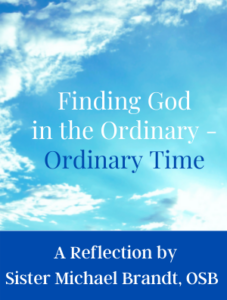Finding God in the Ordinary – Ordinary Time by Sister Michael Brandt, OSB
 Recently I gave a talk to our Benedictine Oblates on the notion of “finding God in the Ordinary.” The most startling insight I gleaned from that experience was the realization of the significance of “ordinary time.” Indeed, we are living it liturgically at this very moment, and I did not even notice.
Recently I gave a talk to our Benedictine Oblates on the notion of “finding God in the Ordinary.” The most startling insight I gleaned from that experience was the realization of the significance of “ordinary time.” Indeed, we are living it liturgically at this very moment, and I did not even notice.
Ordinary time refers to all those parts of the Catholic Church’s liturgical year that are not included in the major seasons of Advent, Christmas, Lent and Easter. It is a time when we are not celebrating any particular mystery of our faith, but rather the mystery of Christ’s presence in all facets of our lives. As such, is it the “boring” part of the Church’s liturgical year since there is no readily obvious object of anticipation or joy? It helps to understand that the “ordinary” to which we refer has nothing to do with being special or not, but rather it refers to time that is ordered.
The Scripture readings of these times carry us away through the teaching and ministry of Jesus and encourage us in everyday life to grow in our faith. Even in “ordinary time” we experience celebration by taking part in Christ’s life through reception of Eucharist, and we experience anticipation as we long for His second coming.
Not to downplay any possible suggestion for how we might mark “ordinary time” in a special way, but I best identify with the practice of seeking to resemble Jesus in small ways. Why? – because without the busy preparations and celebrations of the other liturgical seasons, the relative calm of “ordinary time” can help us to be more alert for those brief times when we can be like Him, when we can fully do God’s will, when we can even come to realize that our spiritual and everyday lives can be one. Ordinary time – a time of conversion, growth, and maturation – is meant to be lived as participating in Jesus’ everyday life.
Generally, everyday life facilitates our getting caught up in things – politics, social media, status, worry, etc., whereas if we were caught up in Christ, we would likely want our lives to change. We might examine our habits, or integrate thanks into each day, or even imagine, visualize, our lives as a bystander amidst the Gospel narratives. I am certain we can think of many other ways to refashion our lives. However, above all, remember that “ordinary time” is anything but ordinary, though to experience the true power of the season, we must live it. Again… to experience the true power of the season, we must live it! Can you imagine a world in which each and every person viewed everything as God in the “ordinary”? What a world that would be!
You might look for greater clarity on this topic by searching the actual writings/presentations of Ronald Rolheiser, Max Lucado, and Joan Chittister, whose ideas are the basis of this “sharing.”
